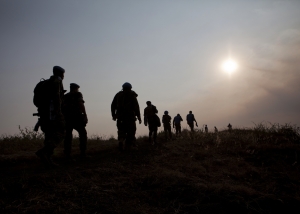
Switzerland: Ensuring that Security Council sanctions are carefully targeted and procedures fair and clear
Switzerland – together with the Group of Like-Minded States on targeted sanctions – regularly proposes measures to the Security Council to continue to ensure that sanctions are carefully targeted and that fair and clear procedures are maintained and further developed.

Switzerland: Clarifying legal rules regarding Private Military and Security Companies (PMSCs)
Switzerland has worked both at the international level (with the International Committee of the Red Cross) and the national level towards clarifying the rules applying to the operations of Private Military and Security Companies (PMSCs).

Switzerland: Handbook on accepting the jurisdiction of the International Court of Justice
To assist States willing to recognise as compulsory the jurisdiction of the ICJ, Switzerland has worked with the Netherlands, Uruguay, the United Kingdom, Lithuania, Japan and Botswana on a publication to assist States wishing to recognize as compulsory the jurisdiction of the International Court of Justice (ICJ).

United States of America: Legal Aid Interagency Roundtable
The White House Domestic Policy Council and the U.S. Department of Justice have launched the “Legal Aid Interagency Roundtable” to explore ways in which civil legal aid can support Federal efforts to promote access to health services, housing, education, employment, family stability, and community well-being.

Austria: Gender budgeting
Austria is one of three countries worldwide which have implemented Gender Budgeting in their constitutions. Gender Budgeting is an essential instrument for establishing gender mainstreaming within government policies and assigning clear responsibilities, making governments accountable for their gender policy commitments. The Federal Ministries need to target equality between women and men in their budget documents. This means the integration of gender objectives, measures and indicators in the strategy reports, in the federal budget and in the supplementary sheets on the basis of the Federal Budget Act.

Austria: Measures to prevent human trafficking for domestic servitude in diplomatic households
Austria has developed regulations and measures to support and protect private domestic staff (PDS) against labour exploitation, while continuing to enable their employment of PDS by diplomatic agents and officials of international organizations in accordance with relevant international law.

Austria: Task Force on Combating Human Trafficking
In order to address all aspects of human trafficking in a comprehensive and interdisciplinary manner, Austria has set up a Task Force on Combating Human Trafficking, which not only comprises representatives of all competent ministries and the federal provinces but also representatives of non-governmental organizations and academia. This national coordination mechanism provides the framework for very close cooperation of all stakeholders. One of its main tasks is the elaboration and monitoring of implementation of the National Action Plan on Combating Human Trafficking (currently for the period 2015-2017). The active involvement of NGOs provides for an inherent “reality check” whether victim-centered measures work in practice.

Austria: Vienna course on international law for military legal advisers
Since 2004, the Austrian Ministry of Defence has regularly organized the “Vienna Course on International Law for Military Legal Advisers”, which is provided under the auspices of the European Security and Defence College (ESDC) with the aim of contributing to the establishment of a common European Security Culture. The main aim of this rule of law training course is to convey core knowledge about the application of international law, in particular human rights law and international humanitarian law, to international crisis-management operations by military and security forces. Participants from other States also have the possibility to participate.

Austria: Identification and implementation of anti-corruption prevention projects
Structural corruption prevention by the Austrian Federal Bureau of Anti-Corruption takes the form of projects, which generally focus on the structure/organization and workflow, weak points, law and identification of motives. The results of the analysis are the basis for the development of specific preventive measures, which are prepared in cooperation with the department or authority having requested the service.

Mongolia: National MDG-9 on human rights, governance and anti-corruption
In 2005, Mongolia became the first country to formulate a ninth MDG on human rights, democratic governance, and anti-corruption in addition to the globally recognized eight MDGs, and thereby emphasize the role of democratic governance in successfully achieving the MDGs and other socio-economic development goals.
